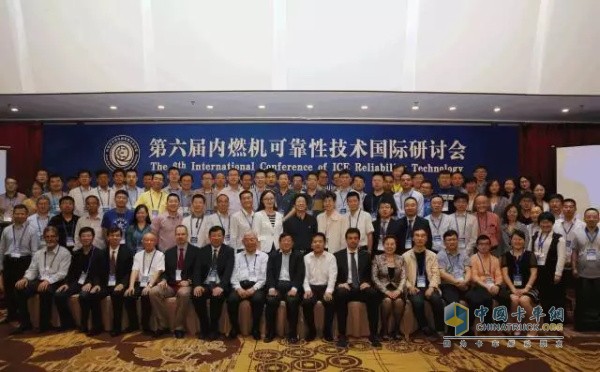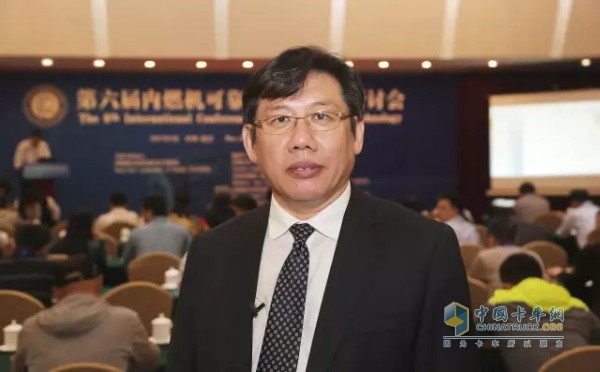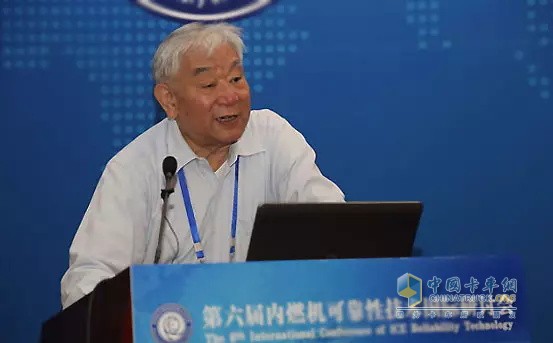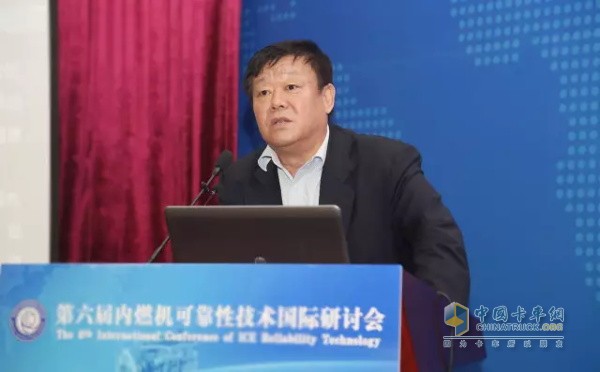 The 6th International Symposium on Reliability of Internal Combustion Engines
The 6th International Symposium on Reliability of Internal Combustion Engines This event brought together many experts and scholars from well-known R&D institutions, universities, auto and internal combustion engines, and parts and components companies at home and abroad. The fierce battles at the meeting constantly collided with new ideas on improving the reliability of internal combustion engines. Come and listen to everyone.
The technical difficulty of reliability lies in its complexity
"As an important index to measure the quality of internal combustion engines, reliability is not only the biggest gap between China's internal combustion engine and the world's advanced level, but also the key to China's internal combustion engine products from the low to the high end." Director of the State Key Laboratory of Engine Reliability, Tong Dehui, vice president of diesel power at the 6th International Symposium on Reliability of Internal Combustion Engines, revealed the importance of reliability to the development of China's internal combustion engine industry.
 Director of State Key Laboratory of Reliability of Internal Combustion Engines, Vice President of Weichai Power Co., Ltd.
Director of State Key Laboratory of Reliability of Internal Combustion Engines, Vice President of Weichai Power Co., Ltd.
The internal combustion engine is the core component of the vehicle. Its technical level, quality and reliability are critical to the vehicle technology and performance. Therefore, improving the reliability of the engine and the vehicle has become the consensus of the industry. Where do you want to improve the reliability of the internal combustion engine?
"The reliability of the internal combustion engine is more complex than other mechanical devices. The operation of other devices is basically a physical process, and the internal combustion engine is a machine that seems to have life." Su Wanhua, Academician of the Chinese Academy of Engineering and Director of the Academic Committee of the State Key Laboratory of Reliability of Internal Combustion Engines, believes that internal combustion engines There is not only a very complicated air system and a combustion process in which fuel energy is released, but also the design, manufacture, maintenance and maintenance of the internal combustion engine all contribute to the improvement of its reliability. This is a more complicated project.
 Academician Su Wanhua, Academician of the Chinese Academy of Engineering and Director of the State Key Laboratory of Reliability of Internal Combustion Engines
Academician Su Wanhua, Academician of the Chinese Academy of Engineering and Director of the State Key Laboratory of Reliability of Internal Combustion Engines
Professor Cui Yi of Shanghai Jiaotong University also pointed out that the technical difficulties in the reliability of internal combustion engines lie in the accumulation of big data including material, component fatigue, and damage during use, which requires a lot of time and experimentation; “Reliability involves materials In addition, Cui Yi believes that quality management is also an important factor in reliability, even if the theory, design, production line and hardware equipment are advanced, but if the production, technology, design, lubrication and other aspects, multidisciplinary collaborative research is also one of the difficulties. The quality control in the manufacturing process is not in place, and reliability is also difficult to improve.
Although the results are significant, the gap remains
"Now, whether it is the internal combustion engine technology route, safety performance improvement or the next step in the industry's strategic planning, has added the element of 'reliability'." Xing Min, executive vice president and secretary-general of the China Internal Combustion Engine Industry Association, said, Weichai internal combustion engine The establishment of the State Key Laboratory of Reliability shows that the country attaches importance to the reliability of the internal combustion engine; and the establishment of the IC Engine Reliability International Technical Innovation Coalition indicates that the internal combustion engine industry takes reliability as a key factor in the design and production of internal combustion engines and actively promotes it. .
 Xing Min, executive vice president and secretary general of China Internal Combustion Engine Industry Association
Xing Min, executive vice president and secretary general of China Internal Combustion Engine Industry Association
China's internal combustion engine companies have conducted many years of exploration in reliability technology applications and gained valuable practical experience. Research institutes and universities at home and abroad, such as Tsinghua University, Tianjin University, and Zhejiang University, are increasingly studying the basics of the reliability of internal combustion engines. Achievements have been made. The International Symposium on Reliability of Internal Combustion Engines has been successfully held for six times and many other efforts, all of which have positively contributed to the improvement of the reliability technology of the internal combustion engine industry.
With the joint efforts of the entire industry, the reliability of our internal combustion engines has been significantly improved. According to De Dehui, the general measure of the reliability of internal combustion engines is the life of B10. This indicator was about 500,000 kilometers in China 10 years ago. It can basically reach 1 million kilometers, and its reliability life has doubled in less than 10 years. The best product B10 can even reach the international advanced level of 1.8 million kilometers.
Although the results are commendable, Wu Shaoming, vice president and secretary-general of the China Association of Automobile Manufacturers, also pointed out that China is now a large automobile country, but it is not a strong automobile country. There are many gaps between us and foreign automobile giants, including the research on the reliability of internal combustion engines. And application.
Weichai Leads Reliability to New Heights
In recent years, Weichai has made many efforts and contributions in the research and application of reliability technology for internal combustion engines, and regards "reliable and durable" as the core competitiveness of its products. Since the establishment of the first key laboratory for reliability of internal combustion engines established in Shandong Province in 2009, Weichai has carried out a lot of research and led the establishment of the Reliability of Engines International Technology Innovation Alliance and the National Standardization Committee of Internal Combustion Engines Reliability Group. Internal combustion engine reliability standard system framework.
In September 2015, the Ministry of Science and Technology formally approved Weichai’s State Key Laboratory of Reliability of Internal Combustion Engines. Relying on the industry's only national key laboratory for internal combustion engine reliability, Weichai has continued to improve the reliability of Weichai internal combustion engines by focusing on the three research directions of the reliability of the entire engine, the reliability of key components, and the reliability prediction and evaluation technology for internal combustion engines.
Through the long-term cultivation of key technologies for the reliability of internal combustion engines, the B10 life of Weichai engines has been at the forefront of the industry, and heavy-duty diesel engines for automobiles have reached European and American standards. The average failure interval of the WP13 engine that was launched in 2015 was more than 250,000 kilometers. The new H-platform WP9H/WP10H engine B10, which was launched in 2016, has a life expectancy of 1.8 million kilometers/30,000 hours, setting the highest standard for high-speed and heavy-duty engine life.
In addition to its commitment to its own development, Weichai also upholds the sense of responsibility of veterans in the industry and actively promotes the advancement of reliability technology for internal combustion engines in China. It has cooperated with domestic and foreign research institutes and companies to develop more than 40 key technology projects for internal combustion engines, opening up research results to the industry. shared. Weichai has led China's internal combustion engine reliability technology to a major step forward in the international advanced level through the cooperation of research, production, research and development with government systems, research and development communities, and application of collaborative communities.
Linear Alkyl Benzene Sulphonic Acid
Linear Alkyl Benzene Sulphonic ACID (LABSA), Brown liquid, Molecular Formula: C18H30O3S, Trade Nam Sulfonic Acid, Melting Point 10°C, Density 1.06g/ml, Class 8 chemical,it is a largest volume surfactant because of its low cost, good performance; environmental friendliness .For the production of sulfonic acid, LABSA, alkaline benzene linear sulfation is usually used. Its components: linear alkyl benzene, oxygen, sulfur and Citric Acid.
Linear Alkyl Benzene Sulphonic Acid is a batch of organic sulfur compounds that are used in most home detergents, dishwashing detergents, Detergent powder, cleaning powder, washing powders, detergent cake, liquid soap, soaps etc. LABSA, sulfonic acid compound is used as a foaming agent , cleaning agent in more formulations and toilet soaps for foaming. Sulfonic acid, LABSA is using in detergent industries, in textile industry as a washing agent, pesticides industries to improve the quality of spray. Sulfonic acid, LABSA is not inflammable substance and can dissolve in water, but not in organic solvent.
Application detail:
In hair shampoo, bath shampoo, dish detergents and complex soap, laundry powder, dishware cleaner in daily chemical industry.
it is also used in wetting and clearer , dyeing assistant in textile industry.
Degrease agent in electroplate and leather manufacture.
De-inking agent in paper making.
Alkyl Benzene Sulphonate,Alkyl Benzene Sulphonic Acid,Linear Alkyl Benzene Sulphonic Acid,Linear Alkyl Benzene Sulphonic Acid Detergent
HENAN JINHE INDUSTRY CO.,LTD , https://www.hntitaniumdioxide.com